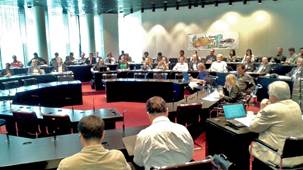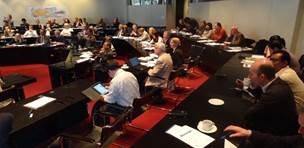
120 participants from Austria, Bangladesh, China, Germany, India, Malaysia, United Kingdom and USA and from 15 disciplines (from arts and science, from Geography to Anthropology, Architecture, Medicine, Meteorology, Planning and Sinology etc.).
The conference concluded the large joint research program on informal dynamics of megaurban development within the context of global change which was funded for eight years and was investigating informal phenomena, processes and negotiations in the two regions of Dhaka/Bangladesh and the Pearl River Delta/China. Researchers from 16 disciplines, both from natural and social sciences, worked together in interdisciplinary teams in 11 projects. During the conference, synthesis papers were presented which analysed the complex configurations of informality in the megaurban context.
In looking back, a successful megacity research program was concluded which was developed since 2000 in close cooperation with the MegaCity TaskForce of the International Geographical Union and the German National Committee of Global Change Research (NKGCF). From 2002 onwards, the idea of establishing a so-called priority program was discussed in three large round table meetings (in 2002, 2003 and 2004). Based on interdisciplinary conceptualization, an application was submitted to the German Research Foundation in 2005. After its successful selection in a competitive international evaluation, the priority program was established as “Megacities – Megachallenge: Informal Dynamics of Global Change” (SPP 1233).
Between 2006 and 2013, 13 interdisciplinary and international projects were conducted between 17 partner universities in Germany and 11 partner universities in China and Bangladesh. 11 international Memorandum of Understanding and partnership agreements as well as one university partnership (Sun Yat-sen University Guangzhou and the University of Cologne) resulted. About 120 researchers in the entire network, from principal investigators to postdocs and PhD candidates undertook intensive field work in the two project regions and convened in more than 50 workshops and seminars (incl. PhD candidates‘ seminars). One Postdoc finished his so-called habilitation during the program period, one more habilitation is still in progress. 18 PhD candidates from Bangladesh, China and Germany finished their thesis, further 19 more are currently about to finish their PhD thesis.

More than 200 publications emerged, among them more than 60 articles in peer-reviewed journals. 7 books within the reviewed book series “Megacities and Global Change” were published.
The programs aims were to
* understand phenomena, processes and relationship of informal dynamics of global change in megacities and
* develop theoretical approaches and models for explanation of informal processes and structures in megacities.
This included
Four problem areas with highest dynamics and social relevance were selected: (1) new forms of governance, (2) urban economies, (3) material and resource flows and (4) settlement development. The 13 research projects focused on: (1) The struggle for urban livelihoods and the quest for a functional city, (2) reconciling informal and statutory planning institutions, (3) the metropolitan food system, (4) informal settlements, economic and environmental change, and public health, (5) natural hazards and climate change: Future trends, social adaptation and informal dynamics, (6) border-drawing and spatial differentiation of urban governance modes, (7) analysis of informal dynamics in mega urban areas – based on spatial structure and steering mechanisms focused on water, (8) informal migrant communities and health strategies in urban villages – linking global change and urban health, (9) satellite-based aerosol mapping over megacities: Development of methodology and application in health and climate related studies, (10) the dynamics of peri-urbanization in the Pearl River Delta: emerging land use patterns, urban villages, global linkages, (11) informal dynamics of agile firm organisation, (12) Governance in time: Spatial differentiation and temporal change of urban development and redevelopment and (13) the central coordination project.
On the conceptual level, the program focused on informality in megacities on an ontological level, exchanged about the „nature“ of informality, of what is (and what is not) informal, whether informality was there before formality and about normative notions. The debate moved on to theorising informality as agency, informal institutions and informal modes of negotiation. Furthermore, a political dimension was taken up, in analyzing the state‘s (or it‘s representatives‘) relation towards informality, including „elite informality“.
The program was connected with international networks and research programs such as the
Further details of the program can be obtained at the webpage
www.megacities-megachallenge.org

The closing conference was organized by the University of Cologne and was funded by the German Research Foundation (DFG).

